| Listing 1 - 10 of 62 | << page >> |
Sort by
|
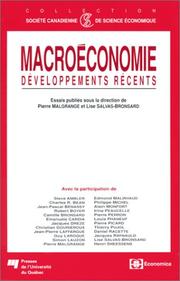
ISBN: 2760506606 2717824626 9782717824629 9782760506602 Year: 1993 Publisher: Paris : Economica,
Abstract | Keywords | Export | Availability | Bookmark
 Loading...
Loading...Choose an application
- Reference Manager
- EndNote
- RefWorks (Direct export to RefWorks)
Macroeconomics --- Macroeconomics. --- Econometric models --- Equilibrium (Economics) --- Unemployment --- Competition --- Economic policy --- Macroéconomie --- Modèles économétriques --- Équilibre (Économie politique) --- Chômage --- Concurrence --- Politique économique
Book
ISBN: 9061962196 Year: 1981 Volume: 140 Publisher: Amsterdam
Abstract | Keywords | Export | Availability | Bookmark
 Loading...
Loading...Choose an application
- Reference Manager
- EndNote
- RefWorks (Direct export to RefWorks)
Operational research. Game theory --- Economics --- Economics, Mathematical --- Equilibrium (Economics) --- Topology --- Mathématiques économiques --- Equilibre (Economie politique) --- Topologie --- Mathématiques économiques
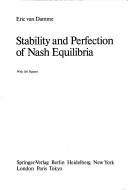
ISBN: 0387171010 3540171010 3642969801 364296978X 9783540171010 9780387171012 Year: 1987 Publisher: Berlin: Springer,
Abstract | Keywords | Export | Availability | Bookmark
 Loading...
Loading...Choose an application
- Reference Manager
- EndNote
- RefWorks (Direct export to RefWorks)
Equilibrium (Economics) --- Game theory --- Equilibre (Economie politique) --- Théorie des jeux --- Operational research. Game theory --- Théorie des jeux
Book
ISBN: 271780403X Year: 1984 Publisher: Paris
Abstract | Keywords | Export | Availability | Bookmark
 Loading...
Loading...Choose an application
- Reference Manager
- EndNote
- RefWorks (Direct export to RefWorks)
Economic growth --- Business cycles --- Macro-economie --- Macroeconomics --- Macroéconomie --- Equilibrium (Economics) --- Economic development --- Equilibre (Economie politique) --- Développement économique --- Macroéconomie --- Développement économique --- Économie politique --- Inflation
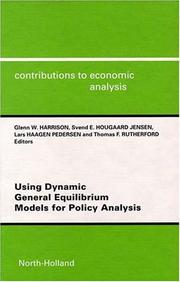
ISBN: 0444502238 9780444502230 Year: 2000 Volume: 248 Publisher: Amsterdam: Elsevier,
Abstract | Keywords | Export | Availability | Bookmark
 Loading...
Loading...Choose an application
- Reference Manager
- EndNote
- RefWorks (Direct export to RefWorks)
Economic policy and planning (general) --- Quantitative methods (economics) --- Beleidswetenschappen --- Policy sciences --- Politique [Sciences de la ] --- Sciences de la politique --- Equilibrium (Economics) --- Policy sciences. --- Equilibre (Economie politique) --- Mathematical models. --- Modèles mathématiques --- Mathematical models --- Modèles mathématiques --- Equilibrium (Economics) - Mathematical models
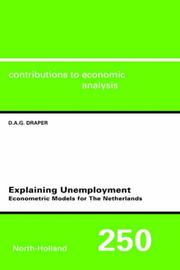
ISBN: 0444506926 184950847X Year: 2001 Volume: 250 Publisher: Amsterdam : Elsevier,
Abstract | Keywords | Export | Availability | Bookmark
 Loading...
Loading...Choose an application
- Reference Manager
- EndNote
- RefWorks (Direct export to RefWorks)
Europe's notoriously high level of unemployment is one of the big puzzles of empirical macroeconomics. In recent years, the unemployment rate has fallen in The Netherlands, but the overall level in OECD Europe remains high. An investigation into why Dutch economic policy has been relatively effective could be useful for the unemployment debate in Europe. This book contributes to this investigation with its empirical analysis covering three important topics. The first part of the book investigates whether (macro) economic policies could be effective in reducing unemployment in the short run. This depends on the cause of unemployment: is it due to lack of demand for goods, or is it due to a shortage of capacity. Another question is whether macroeconomic policies can be directed to one side of the market. The high rate of unemployment among low-skilled workers is the topic of the second part of this book. How important is the impact of wage inflexibility at the lower tail of the income distribution due to institutional factors? To what extent is it caused by skill-biased technological change? A central issue is, again, how economic policy could contribute to reducing unemployment among low-skilled workers? The persistence of unemployment is investigated in the third part. Since the early eighties, Dutch policymakers have employed wage moderation as a remedy for unemployment in The Netherlands. Substantial cutbacks were made in the social security programme. This had a moderating effect on wages, which is thought to have contributed to employment growth. However, unemployment remained rather high up to 1997. Why didn't unemployment fall more quickly? To answer these questions, economists have developed different structural macroeconometric models. The Netherlands has a rich tradition in using macroeconomic models for policy analysis. This tradition originates in the work of Jan Tinbergen, Nobel laureate in economics, and the first director of CPB Netherlands Bureau for Economic Policy Analysis. This book, which builds on CPB's broad experience with macroeconomic modelling, makes an important contribution to this fine Dutch tradition.
Labour market --- Quantitative methods (economics) --- Netherlands --- Equilibrium (Economics) --- Unemployment --- Macroeconomics --- Equilibre (Economie politique) --- Chômage --- Macroéconomie --- Mathematical models. --- Econometric models --- Modèles mathématiques --- Modèles économétriques --- Pays-Bas --- Economic conditions --- Conditions économiques --- Econometric models.
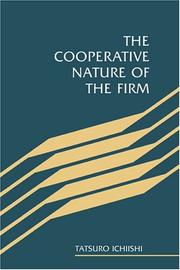
ISBN: 052141444X 9780521414449 Year: 1993 Publisher: Cambridge: Cambridge university press,
Abstract | Keywords | Export | Availability | Bookmark
 Loading...
Loading...Choose an application
- Reference Manager
- EndNote
- RefWorks (Direct export to RefWorks)
Microeconomics --- Equilibrium (Economics) --- Game theory --- Industrial organization --- Welfare economics --- Equilibre (Economie politique) --- Théorie des jeux --- Industrie --- Economie du bien-être --- Organisation, contrôle, etc --- Game theory. --- Welfare economics. --- Théorie des jeux --- Economie du bien-être --- Organisation, contrôle, etc
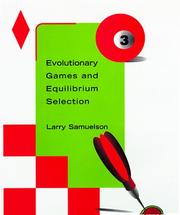
ISBN: 0262692198 0262193825 9780262692199 9780262193825 Year: 1998 Volume: 1 Publisher: Cambridge (Mass.) : MIT press,
Abstract | Keywords | Export | Availability | Bookmark
 Loading...
Loading...Choose an application
- Reference Manager
- EndNote
- RefWorks (Direct export to RefWorks)
Noncooperative games (Mathematics) --- Théorie des jeux --- Jeux non coopératifs (Mathématiques) --- Equilibre (Economie politique) --- Théorie des jeux --- Jeux non coopératifs (Mathématiques) --- Evolutionary games --- Operational research. Game theory --- Game theory --- Equilibrium (Economics)
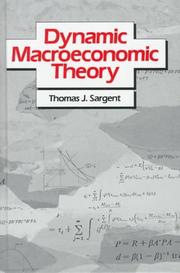
ISBN: 0674218779 9780674218772 Year: 1987 Publisher: Cambridge (Mass.) : Harvard university press,
Abstract | Keywords | Export | Availability | Bookmark
 Loading...
Loading...Choose an application
- Reference Manager
- EndNote
- RefWorks (Direct export to RefWorks)
Macroeconomics --- Equilibrium (Economics) --- Macroéconomie --- Equilibre (Economie politique) --- Mathematical models --- Modèles mathématiques --- Mathematical models. --- 330.101 --- -Macroeconomics --- -#abib:aleo --- AA / International- internationaal --- 330.00 --- 330.3 --- 330.01 --- -Equilibrium (Economics) --- -339.0724 --- Economics --- Economische analyse. Economische methodologie. Economische onderzoeksmethoden--(theoretische economie) --- Economische en sociale theorieën: algemeenheden. --- Methode in staathuishoudkunde. Statische, dynamische economie. Modellen. Experimental economics. --- Theorie van het economisch evenwicht. --- 330.101 Economische analyse. Economische methodologie. Economische onderzoeksmethoden--(theoretische economie) --- Macroéconomie --- Modèles mathématiques --- 339.0724 --- #abib:aleo --- Economische en sociale theorieën: algemeenheden --- Theorie van het economisch evenwicht --- Methode in staathuishoudkunde. Statische, dynamische economie. Modellen. Experimental economics --- Macroeconomics - Mathematical models --- Equilibrium (Economics) - Mathematical models --- Équilibre (économie politique) --- Équilibre (économie politique)
Book
ISBN: 0444879374 9780444879370 Year: 1986 Volume: 157 Publisher: Amsterdam : North-Holland,
Abstract | Keywords | Export | Availability | Bookmark
 Loading...
Loading...Choose an application
- Reference Manager
- EndNote
- RefWorks (Direct export to RefWorks)
Economics --- Equilibrium (Economics) --- Oligopolies --- Equilibre (Economie politique) --- Oligopoles --- Economic concentration --- Monopolies, Partial --- Partial monopolies --- Competition, Imperfect --- Interorganizational relations --- Disequilibrium (Economics) --- Economic equilibrium --- General equilibrium (Economics) --- Partial equilibrium (Economics) --- Stagnation (Economics) --- Statics and dynamics (Social sciences) --- Oligopolies. --- Equilibrium (Economics). --- DGE (Economics) --- DSGE (Economics) --- Dynamic stochastic general equilibrium (Economics) --- SDGE (Economic theory) --- Equilibre économique. --- Oligopoles. --- Economisch evenwicht.
| Listing 1 - 10 of 62 | << page >> |
Sort by
|

 Search
Search Feedback
Feedback About UniCat
About UniCat  Help
Help News
News